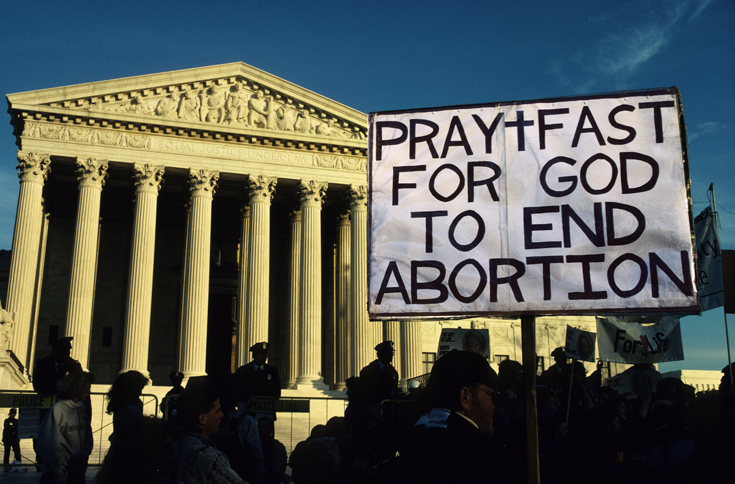In 2020, a United Methodist pastor in Birmingham, Alabama, named Dave Barnhart wrote something on social media, about critics of abortion, that provoked quite a reaction from all sides of the debate.
He said that the “unborn” are a very convenient group to organize around because they don’t make any demands of you and they’re not morally complicated—unlike those in prison, those with addictions, or those trapped in poverty. “You can love the unborn and advocate for them without substantially challenging your own wealth, power, or privilege, without re-imagining social structures, apologizing, or making reparations to anyone. They are, in short, the perfect people to love if you want to claim you love Jesus but actually dislike people who breathe.”
It’s a strong and determined statement. It does seem that those who describe themselves as pro-life are extremely selective in their areas of compassion. That, at least, is true of a great many within the movement. Indeed, by their increasing support for extreme conservative politicians and policies, they’re not merely indifferent to Christian causes but actively hostile toward them. But, first, let’s look at what Jesus and the scriptures actually say about the subject of abortion. You may be surprised.
As with homosexuality and a number of other topics that seem to so energize and enrage conservative Christians, abortion is hardly mentioned in the Bible.
There is ample evidence to show that abortion was practised in the ancient world—in Egypt, for example, as far back as sixteen centuries before the birth of Christ. What we don’t find are many prohibitions against it. Pro-lifers will point to the command of God in Genesis, “Whoever sheds the blood of a human, by a human shall that person’s blood be shed; for in his own image God made humankind.” So, murder is punished by murder. Which is a strict legal code for an ancient people living without police, a sophisticated justice system, or any of the social or prohibitive structures taken for granted in modern times. But this passage is about one adult killing another, and it has nothing at all to do with abortion.
That doesn’t mean, of course, that abortion isn’t mentioned in scripture. One example is when Jeremiah, writing around 600 BCE, curses the day he was born. “Cursed be the man who brought the news to my father, saying, ‘A child is born to you, a son,’ making him very glad. Let that man be like the cities that the Lord overthrew without pity; let him hear a cry in the morning and an alarm at noon because he did not kill me in the womb; so, my mother would have been my grave, and her womb forever great.”
It’s a cry of deep sadness and despair, but it doesn’t imply prohibition or condemnation. It’s not, perhaps unsurprisingly, a biblical reference we hear from the anti-abortion movement, but another quote from Jeremiah most certainly is. “Before I formed you in the womb, I knew you, and before you were born, I consecrated you; I appointed you a prophet to the nations.”
This is a big one for anti-abortion activists and has become a virtual slogan. Largely because it’s one of very few that they can find. But it has to be read within its context and stated reason. It’s a reference to a special plan for one man rather than a general approach to biology and reproduction, a reference to the vision of God and the importance of Jeremiah and his mission. It’s also biblical hyperbole, written in a language that constantly uses rhetoric and poetry to make a particular point.
Another oft-used quote, and another that mentions the womb, is in Psalm 139. “For it was you who formed my inward parts; you knit me together in my mother’s womb. I praise you, for I am fearfully and wonderfully made. Wonderful are your works; that I know very well. My frame was not hidden from you, when I was being made in secret, intricately woven in the depths of the earth. Your eyes beheld my unformed substance. In your book were written all the days that were formed for me, when none of them as yet existed.”
Lyrical and beautiful stuff. But, again, what is being said? This passage is surely about God’s power, but it doesn’t say anything that is at all specific or exclusive to the fetus. The Christian belief is that God knows all, knows us, knows who and what we are. Knows, remember, the woman who is desperate, poor, young, and alone—who can’t afford to have a child, who was raped or abused, who is terrified, who has no health care, who is crying out, after much thought and consideration, to terminate her pregnancy. Knows the goodness and purity in her heart and the harshness of those who condemn. Put simply, the ancient, biblical statement that God is all-powerful has no relevance to the rights of women over their own bodies.
The other biblical text sometimes used to oppose abortion is the story of Elizabeth, the mother of John the Baptist, in the New Testament. When she meets with Mary, the mother of Jesus, the following is recounted in the Gospel of Luke: “When Elizabeth heard Mary’s greeting, the child leaped in her womb. And Elizabeth was filled with the Holy Spirit.”
It’s a compelling verse for Christians, linking as it does Jesus, who is the Messiah, with John, who was the Baptist—who would introduce the son of God to the world. But does it have anything at all to say about the subject of abortion? Not really. First because it merely describes movement in the womb and second because this is a reference to people who are not ordinary, not usual, not as the rest of us. This is a poetic illustration of the link between Jesus and John, a scriptural ballad telling of what is of the eternal, the humanizing of salvation. It’s not a guide to female reproduction.
Other than this, the subject is simply not mentioned in the New Testament.
Exodus 21:22 is, however, a part of the Bible that actually does mention the fetus. “When people who are fighting injure a pregnant woman so that there is a miscarriage, and yet no further harm follows, the one responsible shall be fined what the woman’s husband demands, paying as much as the judges determine. If any harm follows, then you shall give life for life, eye for eye, tooth for tooth, hand for hand, foot for foot, burn for burn, wound for wound, stripe for stripe.”
This is fascinating because it outlines specific punishments for specific crimes. If a woman is hurt in a struggle and then has a miscarriage, the penalty is a fine, a mere financial payment. But, if there is further harm, likely meaning the woman has long-term and serious injuries or even dies, then the culprit could be killed. In other words, the life and well-being of the woman, the mother, is of much greater significance than those of her unborn child.
Of course, if opponents of abortion were genuinely to live by the commandment that we must never kill, they would oppose wars, the military, the death penalty, and policies that lead directly to poverty, hunger, ill health, and death. To the contrary, the anti-abortion movement has become increasingly politically conservative over the years—it was, for example, one of the bulwarks of the Donald Trump presidency—and tends to be solidly behind the military and an aggressive foreign policy. It’s usually supportive of the death penalty as well. Contradiction and inconsistency. Abortion isn’t murder, murder is murder. Abortion isn’t a holocaust, the Holocaust was a holocaust. And a woman’s right to choose is a woman’s right to choose.
In terms of the Bible, that is about it. We can dig away at some other scriptural references to try to justify various positions on this issue, but they’re all somewhat tenuous and none of them make an ironclad argument. It’s not that the Bible demands abortion rights, more that it simply doesn’t have anything pertinent to say about the subject. Women’s choice is a central part of the development of gender equality, social liberation, and scientific progress, and it’s downright unbiblical to try to twist scripture to argue against it.
I’ve never met anybody who claims that abortion is good or desirable, but then neither would most people argue that any form of surgery or medical intervention is good or desirable. It can be necessary, life-changing, life-saving, but it’s not generally, in itself, something to be wanted. The matter is further complicated because, in the case of abortion, the “potential” for life certainly exists. Sometimes, though rarely, the reasons for termination are controversial, especially when they involve disability or gender. But these are not the underlying reasons for abortion writ large, and the solution is not to restrict women’s choice but to build societies where those with disabilities do not face discrimination and where gender equality is the absolute norm.
Reluctant as I am to say it, experience leads me to conclude that the anti-abortion movement certainly doesn’t always indicate a Christ-based love for others. The humiliation and degradation inflicted on women outside of clinics is genuinely shocking. I’ve watched protesters howling at vulnerable women walking into clinics, calling them “murderers” and predicting that “God will not forgive” them. Then there are the people who insist on distributing millions of leaflets showing graphic, bloody pictures of abortions, even putting them through the front doors of private homes where it’s likely that children will see them.
While they claim to be nonviolent, it’s difficult to be convinced. Violence has certainly taken place, and it’s included kidnapping, assault, attempted murder, murder, arson, bombings, and stalking. Anti-abortion extremists are considered a domestic terrorist threat by the United States, where most of these incidents occur. There have also been attacks in Australia, New Zealand, Canada, and elsewhere.
In the US, at least eleven people involved in providing abortion services, including four doctors, two clinic employees, a security guard, and a police officer, have been murdered. As recently as late November 2015, in Colorado Springs, a shooting at Planned Parenthood killed three people and injured several others. The suspect described himself as a “warrior for the babies.” In 2001, an extremist named Clayton Waagner mailed hoax letters containing white powder to more than 550 abortion clinics, claiming that these were anthrax attacks.
Even in allegedly peaceful and moderate Canada, it happens. In 1992, Henry Morgentaler’s clinic in Toronto was hit by a firebomb following several less successful arson attacks. In 1997, Manitoba doctor Jack Fainman—an obstetrician who performed abortions—was shot by a sniper as he sat in his living room. Winnipeg police called the attack “terrorism against doctors.” He survived, but his injuries meant that he could never work as a doctor again. This gruesome behaviour is hardly consistent with a life ethic and certainly not with Christian teaching. A violence, an ugliness, and an intolerance has crept into the anti-abortion movement, and the indications are that these emotions and attitudes are becoming worse.
It all seems so manufactured, so rooted in something far outside of the Gospel narrative. It’s also quite recent. In 1968, for example, a meeting held by the Christian Medical Society and the highly influential evangelical magazine Christianity Today concluded that abortion had to be considered in the light of “individual health, family welfare, and social responsibility,” and the organizers refused to describe abortion as sinful. Three years later, the Southern Baptist Convention, perhaps the most important conservative denomination in North America, passed a resolution calling on “Southern Baptists to work for legislation that will allow the possibility of abortion under such conditions as rape, incest, clear evidence of severe fetal deformity, and carefully ascertained evidence of the likelihood of damage to the emotional, mental, and physical health of the mother.”
The reference to the emotional, mental, and physical health of the woman carrying the fetus leaves the door wide open to abortion rights. It also makes the exponential growth of radical opposition to abortion within evangelical Christianity seem extremely contemporary.
It’s part of the emerging parallel between political and religious conservatism, used as a way to mobilize evangelical Christians to work in favour of numerous other right-wing positions and support various conservative political parties. In the US, Republican politicians may have any number of views on different issues, but opposition to abortion has become almost a sacrament in the catechism of reaction. It gives the impression of being far more about politics than about life or faith.
In all of the Christian opposition to abortion, there is a strong element of control, a notion that women don’t merit autonomy and are instead vessels and vehicles for children. They have a duty to be mothers, not the right to be free, independent beings. Apart from the obvious offensiveness of it all, it’s just not biblical. Women are the first to see the resurrected Christ and are not believed by the frightened men who cower in upper rooms and in hiding. A woman, Mary, his mother, tells Jesus to perform his first miracle, the turning of water into wine. It’s Mary who questions an angel, Mary who is so concerned about Jesus’s state of mind during his ministry, Mary who is at the cross when so many others have run away, Mary who says, “He has shown strength with his arm; he has scattered the proud in the thoughts of their hearts. He has brought down the powerful from their thrones and lifted up the lowly; he has filled the hungry with good things and sent the rich away empty.”
Jesus is about the humanity and equality of us all. He is about the brave new world that is light and bright. This magnificent rebel shouldn’t be reduced to a poster or a slogan used to hurt half of the world’s population, to force them into powerlessness and degradation.
Adapted from The Rebel Christ by Michael Coren © 2021. All rights reserved. Published by Dundurn Press Limited.
Correction November 3, 2021: An earlier version of this article misspelled Clayton Waagner’s name. The Walrus regrets the error.





